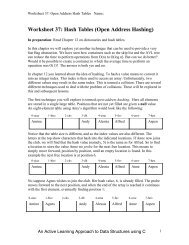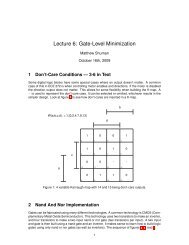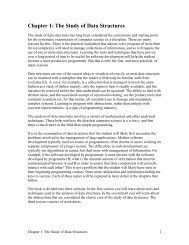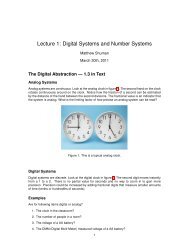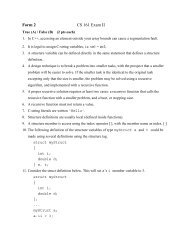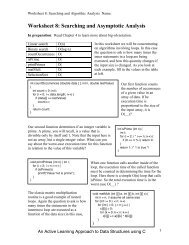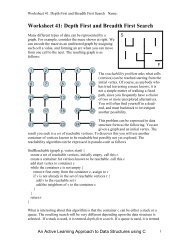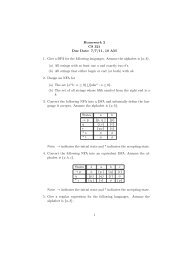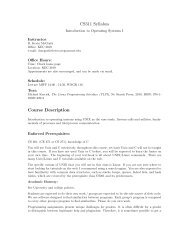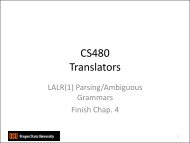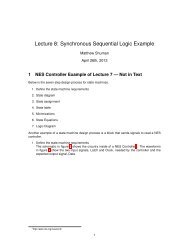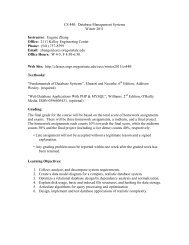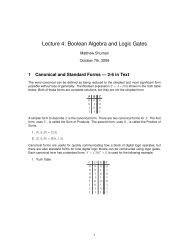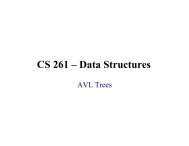Engineering Education and the Development of Expertise - Classes
Engineering Education and the Development of Expertise - Classes
Engineering Education and the Development of Expertise - Classes
Create successful ePaper yourself
Turn your PDF publications into a flip-book with our unique Google optimized e-Paper software.
100 (January 2011) 1 Journal <strong>of</strong> <strong>Engineering</strong> <strong>Education</strong><br />
• Deep learning approaches were correlated with learning experiences that stress<br />
“conceptual connections between <strong>the</strong> content <strong>of</strong> <strong>the</strong> learning domain” (Wierstra<br />
Kanselaarl, Van der Linden, Lodewijks, <strong>and</strong> Vermunt, 2003, p. 514) <strong>and</strong> that were<br />
“student oriented.” The term “student-oriented” describes learning in which students<br />
were active <strong>and</strong> exercise a high degree <strong>of</strong> self-regulation (Wierstra et al.,<br />
2003).<br />
• Surface learning approaches that support reproduction <strong>of</strong> content were correlated<br />
with learning experiences that emphasized “memorizing facts <strong>and</strong> that give students<br />
few incentives toward active participation” (Wiestra et al., 2003, p. 515). They were<br />
also correlated with teaching approaches that focused on transmission <strong>of</strong> knowledge<br />
(Trigwell, Prosser, & Waterhouse, 1999).<br />
• When students experience instruction focused on knowledge transmission, <strong>the</strong>ir<br />
“use <strong>of</strong> deep approach is likely to decline through <strong>the</strong> period <strong>of</strong> <strong>the</strong> course <strong>of</strong> study”<br />
(Kember & Gow, 1994, p. 67). The inverse is also true: <strong>the</strong> use <strong>of</strong> teaching methods<br />
that facilitate use <strong>of</strong> deep approaches to learning will discourage <strong>the</strong> use <strong>of</strong> surface<br />
approaches.<br />
These learning approaches focus on how students process information <strong>and</strong> are <strong>the</strong>refore<br />
cognitive in nature. Deep approaches to learning also require that learners use metacognitive<br />
strategies to manage <strong>the</strong>ir learning processes. Key strategies include monitoring<br />
whe<strong>the</strong>r learning is happening as planned, reflecting on <strong>the</strong> cognitive strategies used,<br />
diagnosing <strong>the</strong> cause <strong>of</strong> difficulties if learning is not happening, <strong>and</strong> adjusting learning<br />
activities accordingly (Vermunt & Vermetten, 2004). Such processes are essential if<br />
learners are to be able to engage in <strong>the</strong> deliberate practice that is <strong>the</strong> key process in developing<br />
expertise.<br />
Studies investigating <strong>the</strong> effects <strong>of</strong> explicit instruction aimed at helping students to develop<br />
strategies for learning in a domain <strong>and</strong> for regulating <strong>the</strong>ir own learning suggest additional<br />
characteristics <strong>of</strong> effective learning experiences. Vermunt <strong>and</strong> Vermetten (2004)<br />
summarize <strong>the</strong> results <strong>of</strong> <strong>the</strong>se studies. Two <strong>of</strong> <strong>the</strong> key findings <strong>the</strong>y report are: that providing<br />
specific instruction on key self-regulation skills improves those skills, as well as exam<br />
performance, in courses in computer science <strong>and</strong> business economics (Volet, McGill, &<br />
Pears, 1995; Masui & DeCorte, 1999); <strong>and</strong> that participation in working groups aimed at<br />
improving learning <strong>and</strong> regulation strategies did improve both, as well as exam performance<br />
(Schatteman, Carette, Couder, & Eisendrath, 1997).<br />
In creating effective learning experiences that encourage students to engage in deep approaches<br />
to learning <strong>and</strong> to integrate <strong>the</strong>ir knowledge <strong>and</strong> skills in solving complex problems,<br />
we must attend to motivation, especially because deep approaches to learning <strong>and</strong> integrated<br />
application <strong>of</strong> knowledge <strong>and</strong> skills place a higher cognitive dem<strong>and</strong> on students<br />
than surface approaches. Pintrich (2003) provides an excellent summary <strong>of</strong> research on <strong>the</strong><br />
role <strong>of</strong> motivation in learning <strong>and</strong> guidelines for designing effective instructional environments.<br />
Key points from his article include:<br />
• Research on both personal <strong>and</strong> situational interest indicates that “higher levels <strong>of</strong><br />
both are associated with more cognitive engagement, more learning, <strong>and</strong> higher levels<br />
<strong>of</strong> achievement.” (p. 674) Instructors should <strong>the</strong>refore provide “stimulating <strong>and</strong><br />
interesting tasks, activities, <strong>and</strong> materials, including some novelty <strong>and</strong> variety in<br />
tasks <strong>and</strong> activities” <strong>and</strong> “display <strong>and</strong> model interest <strong>and</strong> involvement in <strong>the</strong> content<br />
<strong>and</strong> activities” (p. 672).<br />
• In general, “… students who believe that <strong>the</strong>y have more personal control <strong>of</strong> <strong>the</strong>ir<br />
own learning <strong>and</strong> behavior are more likely to do well <strong>and</strong> achieve at higher levels<br />
127



